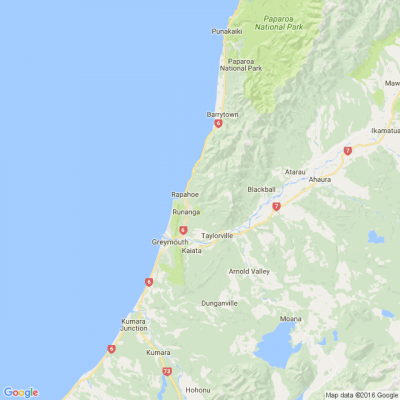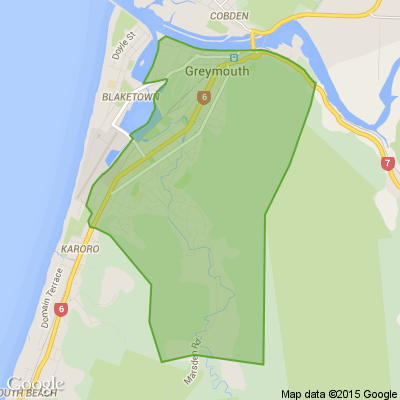Second chance for a say on Coastal Hazard rules
By local democracy reporter Lois Williams:
West Coasters confused or against proposed Coastal Hazard zones now have a second chance to have their say.
Mayors, councillors and iwi overseeing the writing of a new combined district plan for the region have voted unanimously to re-notify 'Variation 2' – the controversial section on Coastal Hazard mapping.
At the Te Tai o Poutini Plan committee meeting on Tuesday, members agreed unanimously to redo the consultation process on the hazard maps and expand it, allowing people to also comment on proposed rules for the hazard zones.
The decision follows a public outcry over the Variation and the way it communicated to the public in June.
Four thousand ratepayers were notified by council letter that new coastal hazard maps (or ‘overlays’) had been created, using updated LiDar surveys, and that their properties were affected.
That could mean they now fell into higher risk hazard areas because of the new data, with implications for building consents, and coastal property values.
They were invited to make submissions on the new maps - but only 112 people did so.
TTPP members reported that many people had binned or ignored the letters because they were written in ‘planner -speak’: impenetrable official language.
Another crucial problem has been brought to light.
People who had submitted on Coastal Hazard maps before 'Variation 2', had been able to also comment on the proposed rules and provisions for those zones.
But those affected by the variation, were asked to submit only on the maps.
They could contest the boundaries or other features in the overlay, but not any rules or restrictions that might apply – even if their homes had not previously been classed as at risk.
Last week, commissioners strongly recommended the TTPP committee renotify the Variation. as soon as possible.
People should be allowed to submit not just on the updated coastal hazard maps, but on the related policies and rules, they said.
In her report to the meeting, TTPP project manager Jo Armstrong supported renotifying as the fairest option, and it would minimise the chance of a costly appeal.
Public submissions could open as early as next week, and close in January, and the commissioners could hear them in March, keeping the TTPP process on track.
There was an opportunity to improve communications and write a clearer set of rules to help people understand the implications, if any, for their properties, Armstrong said.
Grey District councillor Allan Gibson said: “This whole process has been really bad … the public have grizzled about not being able to understand it, not having enough information, not seeing all the paperwork - is it going to be any better this time around? Because they deserve it."
Armstrong said that was the planners’ intention.
“There will be a two-page letter, setting out what the variation is all about, in plain English. Then all the complicated stuff we have to include will be set out separately.”
Gibson said people’s properties had already been devalued because of the proposed new coastal hazard rules, and they were terrified of losing their properties.
He also challenged the need to look a century ahead, in assessing sea level rise, for a 10-year-plan.
“You only have to have a 50-year rule for building houses so why do we need a 100-year-rule for sea level rise?“
Armstrong said the planners would make the rules as enabling as possible within the limits imposed by Government policy and law.
James Beban, a consultant who specialises in hazards planning, told the meeting councils had to follow national directives on managing the risk of sea level rise.
“This Government is actually very hot on natural hazards, very driven by the insurance sector. If New Zealand does not … try to manage hazards in relation to building and development, reinsurers will look at withdrawing from New Zealand. That is clear cut."
Starting with the Labour government and now the current one there had been a significant move to up the (hazard) planning provisions, Beban said.
But renotifying the Variation, and re -opening submissions to the general public was also an opportunity for the planners to rewrite and simply coastal hazard provisions that had been unnecessarily complex the first time around, Beban said.
Makaawhio chairperson Paul Madgwick said he was thrilled the hearing commissioners had stepped in.
“Hats off to them … it’s really a matter of fairness. When something is going to affect West Coasters so profoundly, we should not be stampeding people into making hasty decisions, when they’re not understanding things and at the same time feeling all this anxiety.”
The TTPP team is aiming to renotify the unpopular variation next week, with submissions open through January, and hearings held next March.
*LDR is local body journalism co-funded by RNZ and NZ On Air.
Time to Tickle Your Thinker 🧠
If a zookeeper had 100 pairs of animals in her zoo, and two pairs of babies are born for each one of the original animals, then (sadly) 23 animals don’t survive, how many animals do you have left in total?
Do you think you know the answer? Simply 'Like' this post and we'll post the answer in the comments below at 2pm on the day!
Want to stop seeing these in your newsfeed? No worries! Simply head here and click once on the Following button.

Poll: As a customer, what do you think about automation?
The Press investigates the growing reliance on your unpaid labour.
Automation (or the “unpaid shift”) is often described as efficient ... but it tends to benefit employers more than consumers.
We want to know: What do you think about automation?
Are you for, or against?

-
9.5% For. Self-service is less frustrating and convenient.
-
43.2% I want to be able to choose.
-
47.2% Against. I want to deal with people.
Have you got New Zealand's best shed? Show us and win!
Once again, Resene and NZ Gardener are on the hunt for New Zealand’s best shed! Send in the photos and the stories behind your man caves, she sheds, clever upcycled spaces, potty potting sheds and colourful chicken coops. The Resene Shed of the Year 2026 winner receives $1000 Resene ColorShop voucher, a $908 large Vegepod Starter Pack and a one-year subscription to NZ Gardener. To enter, tell us in writing (no more than 500 words) why your garden shed is New Zealand’s best, and send up to five high-quality photos by email to mailbox@nzgardener.co.nz. Entries close February 23, 2026.







 Loading…
Loading…